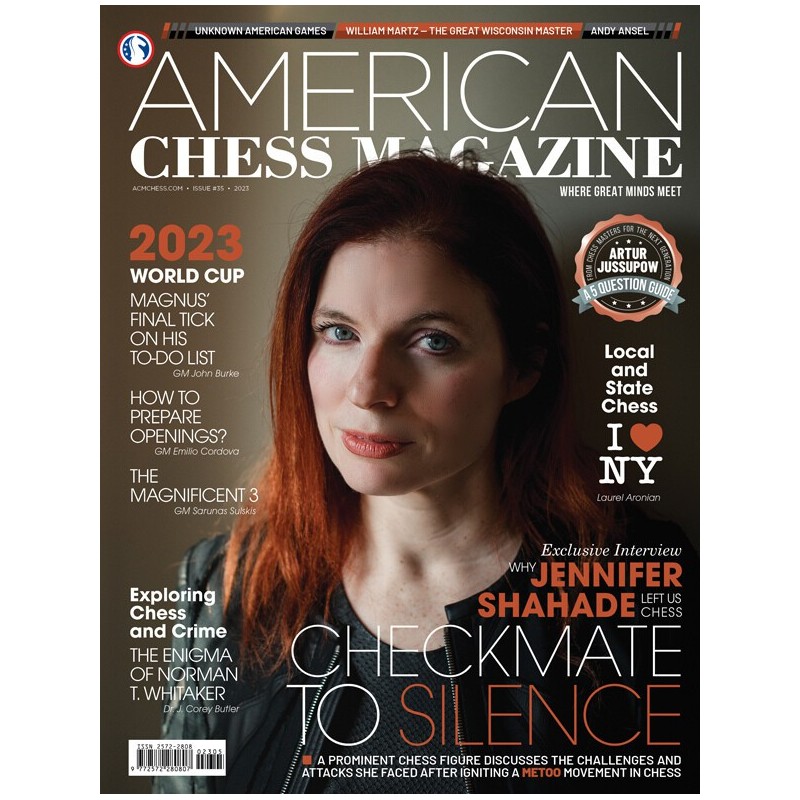- Epuisé



In an exclusive interview, WGM Jennifer Shahade explains why she resigned from the position of Women’s Program Director of US Chess and discusses the challenges and attacks she faced after igniting a METOO movement in chess.
American Chess Magazine #35: Jennifer Shahade (October 2023). In an exclusive interview, WGM Jennifer Shahade explains why she resigned from the position of Women’s Program Director of US Chess and discusses the challenges and attacks she faced after igniting a METOO movement in chess.
After she quit her playing career, Jennifer Shahade’s efforts were directed mainly in promoting chess to girls, as well as publishing several books she wrote on chess. The developing events that exploded at the beginning of 2023 triggered Jennifer’s reaction on social media with a snowball effect – following plenty of challenges and bold decisions she had to make.
The FIDE World Cup held in Baku was certainly a prestigious event in every way. GM John Burke highlights the key moments from this nearly month-long competition – Carlsen’s probably only missing title in classical chess, Caruana’s consecutive qualification for the Candidates Tournament since 2016, the pinnacle of Praggnanadhaa’s career so far, and a melting point for many a favorite.
GM Emilio Cordova explains how to prepare openings reflecting on the variety of players’ choices from the same event. His main advice is to suggest your own ideas to an engine and then check how reasonable they are, instead of following only the top lines suggested by an engine. Likewise, the same advice is here shared by financial expert Luca Barillaro, who refers to similarities in creating an investment plan and a game plan in chess – “don’t get misled by the statistics and choose your own plan tailored to your own style and preference.”
More analysis of the World Cup games follows in our regular Magnificent Three column. This time GM Sarunas Sulskis has selected two highly combative victories by Black from the Open Section, and a brilliancy from the Women’s Section.
The recognition of chess educators and their impact on the chess community is highlighted here by means of a report on the New York City organization ‘Chess in the Schools’, and their initiative to establish an annual Andy Lerner Award for Excellence in Chess Education. Get to know the inaugural award winners who share personal stories about their dedication, hard work and bonds with local communities across the country.
When it is about our regular columns, GM Jacob Aagaard again offers a dozen fresh test positions for readers to train and compare their skills with one of the top American grandmasters, Sam Shankland. In an illustrative example, GM Nikola Nestorovic explains combined threats and how to defend against them, before inviting readers to solve six positions featuring a similar theme.
From his treasure trove, Andy Ansel this time presents William Martz, international master from Milwaukee, Wisconsin. The selection of Martz’s games originates from his unpublished notebook, and Pete Tamburro annotates those that attracted his attention, showcasing Martz’s profound strategical understanding and brilliant positional play.
When it is about local events, our new author Laurel Aronian reports from the New York State Championship – America’s longest-running chess tournament that has very special ties with her family. In a personal narrative, Laurel unveils numerous tiny details from this unique chess gathering in Albany, NY, where people come back year after year, because of the lasting friendships they have gained over this time, and fond memories they will always cherish.
Dr. Corey Butler, professor of psychology, embarks on demystifying the connection between chess players’ styles and opening repertoires with their personalities. The topic is highly controversial and the scientific explanations might sometimes even appear to be entertaining.
FM Dylan McClain deals with a very actual topic – will classical chess soon reach its melting point? Lately the present world’s elite has been more involved with the faster time control competitions, and they’re advocating the thesis that the level of preparation and high drawing tendencies will soon see a demise of classical chess. However, the same elite gladly took part at the recently concluded World Cup, so the question may remain rhetorical after all.
Similarly, World Correspondence Chess Champion Jon Edwards investigates whether chess as a game will be “solved” in the next decade?! From a scientific point of view – with the huge help of AI it may happen, but from a human perspective it’s likely a never-ending story... unless you’re able to find (or even reproduce) a 584-move solution to a position!
ACM endgame expert, GM Alex Fishbein, presents an approach pioneered by the legendary Swedish GM Ulf Andersson – transition to the endgame straight from the opening. Andersson’s legacy has been an inspiration for many, including the author and his son who have successfully applied the knowledge gained from studying this extraordinary concept.
As usual, our Features Editor, FM Grayson Rorrer, had his hands full in documenting significant tournaments played both in the U.S. and abroad, keeping you up-to-date with the latest chess activity. Alexis Levitin offers another interesting chess fiction story, while FM Carsten Hansen reviews ten newly published books, helping you discover valuable resources for improving your chess skills. Finally, in “A Five Question Guide,” legendary GM Artur Jussupow offers valuable advice to the next generation of players based on his vast experience both as a player and a coach.
Fiche technique